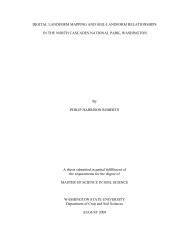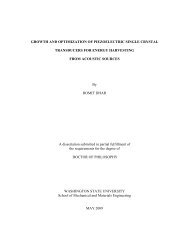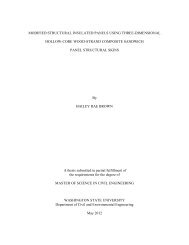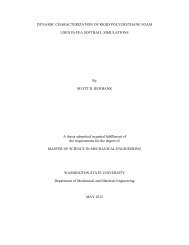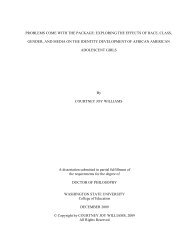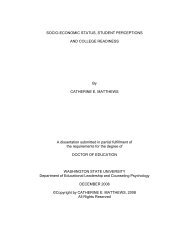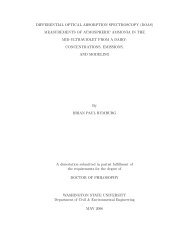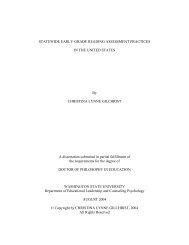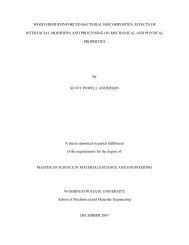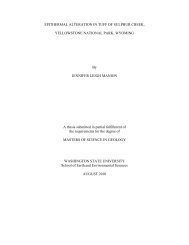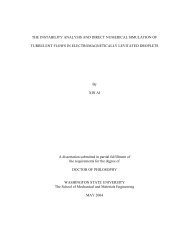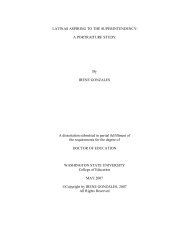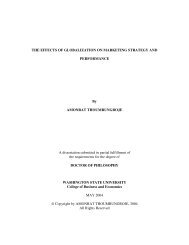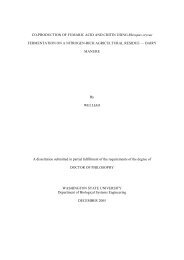the moral reasoning of student athletes and athletic training students
the moral reasoning of student athletes and athletic training students
the moral reasoning of student athletes and athletic training students
You also want an ePaper? Increase the reach of your titles
YUMPU automatically turns print PDFs into web optimized ePapers that Google loves.
a<strong>the</strong>r seem like superfluous solutions for problems nei<strong>the</strong>r foreseen nor recognized” (Rest &<br />
Narvaez, 1994, p. 214). If <strong>athletes</strong> are not at a level <strong>of</strong> <strong>moral</strong> <strong>reasoning</strong> to underst<strong>and</strong> or<br />
internalize <strong>the</strong> rules set by <strong>athletic</strong> governing bodies <strong>the</strong>y will have no motivation to choose a<br />
<strong>moral</strong> action ra<strong>the</strong>r than one based on social or personal desires.<br />
Moral Reasoning <strong>and</strong> Gender<br />
Questions have surfaced concerning <strong>the</strong> measurement <strong>of</strong> <strong>moral</strong> <strong>reasoning</strong> <strong>and</strong> <strong>moral</strong><br />
development relative to gender (Gilligan, 1977; Rest & Narvaez, 1994). These researchers have<br />
argued that females score significantly lower compared to males on cognitive “justice defined”<br />
instruments such as Rest’s (1973) Defining Issues Test. Gilligan argued against Kohlberg’s<br />
(1981) <strong>moral</strong> development <strong>the</strong>ory because Kohlberg based his <strong>the</strong>ory on a large study <strong>of</strong> men<br />
with little to no examination <strong>of</strong> women. In her work “In a Different Voice” (Gilligan, 1977) she<br />
argued that women come from a very different perspective <strong>of</strong> caregiving <strong>and</strong> nurturing as<br />
opposed to a Kohlberg’s justice perspective. However, her argument may be criticized as she<br />
only studied a small sample <strong>of</strong> women who were contemplating a highly emotional issue <strong>of</strong><br />
abortion (Beller, 1990).<br />
While some researchers have found that women score significantly lower than men in<br />
<strong>moral</strong> <strong>reasoning</strong> (Gilligan, 1977; Rest, 1984; Rest & Narvaez, 1994), studies with interscholastic<br />
<strong>and</strong> intercollegiate <strong>athletes</strong> have not found <strong>the</strong> same. In studies using <strong>the</strong> Hahm-Beller Values<br />
Choice Inventory (Hahm, Beller, & Stoll, 1989) female <strong>athletes</strong> <strong>and</strong> non <strong>athletes</strong> as well have<br />
scored significantly higher than males (Beller, 1990; Beller & Stoll, 1995; Beller, Stoll, Burwell,<br />
& Cole, 1996; Beller, Stoll, & Hansen, 2004). Moreover, in preliminary studies <strong>of</strong> <strong>athletic</strong><br />
trainers <strong>and</strong> <strong>athletic</strong> <strong>training</strong> <strong>student</strong>s, females have scored significantly higher compared to<br />
males (Beller, Stoll, Refvem, Williams, & Taylor-Hanson, in review; Beller, Stoll, Williams, &<br />
32



